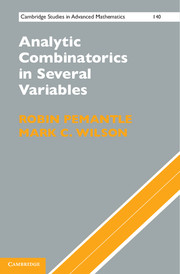2 - Generating Functions
Published online by Cambridge University Press: 05 July 2013
Summary
This chapter gives a crash course on generating functions and enumeration. For a more lengthy introduction, we recommend Wilf (2006). Chapter 14 of van Lint and Wilson (2001) also provides a fairly concise but readable treatment. Proofs for facts about formal power series may be found in Stanley (1997, Section 1.1). A comprehensive treatment of the relation between power series operations and corresponding combinatorial constructions on finite sets is the encyclopedic reference by Goulden and Jackson (2004). Chapters 1–3 of Flajolet and Sedgewick (2009) contain a very nice treatment as well. Bender and Williamson (1991) and Kauers and Paule (2011).
Throughout the book, but particularly in this chapter, the notation [n] denotes the set {1,…,n}.
Formal Power Series
From an algebraic viewpoint, the ring of formal power series is obtained by imposing a particular ring structure on the set of complex arrays of numbers. However, we usually think of them in functional notation as follows. Let z1,…,zd be indeterminates, and consider the set of formal expressions of the form Σrfrzr, which we denote by ℂ[[z1,…,zd]]. Addition is defined by (f + g)r = fr + gr, and multiplication is defined by convolution: (f · g)r = Σsfs gr−s. The sum in this convolution is always finite, so there is no question of convergence. Each array {fr : r ϵ ℕd} corresponds to an element of ℂ[[z1,…,zd]], called its generating function.
- Type
- Chapter
- Information
- Analytic Combinatorics in Several Variables , pp. 15 - 45Publisher: Cambridge University PressPrint publication year: 2013



